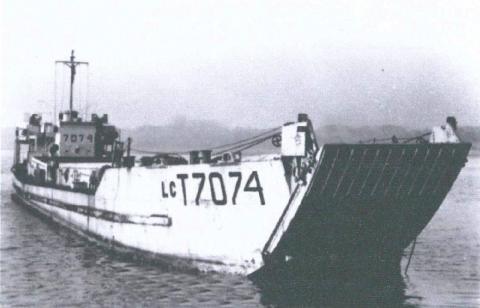
The last D-Day landing craft from Second World War saved for the nation
LCT 7074, the last Second World War Landing Craft (Tank) in the UK, one of the last in the world, and a campaign veteran of the D-Day landings has been saved with the support of a £916,149 grant from the National Memorial Heritage Fund.

The award, to the National Museum of the Royal Navy, represents a last chance to save a priceless example of Second World War and naval heritage.
The grant allows for the transfer of ownership of the vessel to the National Museum of the Royal Navy from Peel Ports and to float her, since she is currently sunk, semi-derelict, at her moorings at East Float Dock, Birkenhead. Plans are now in place to raise her during a two day operation, taking place over 15–16 October.
More than 800 LCTs took part in Operation Overlord, the D-Day landings on 6 June 1944, each capable of carrying ten tanks or other heavy armoured vehicles into battle. Operation Neptune was the naval dimension of Overlord, the largest amphibious operation in history, in which more than 7,000 ships and craft of all sizes landed over 160,000 soldiers on the beaches of Normandy. Of this fleet, fewer than ten are believed to survive, including LCT 7074.
A programme of conservation will be undertaken to make her safe for a temporary move to Portsmouth Naval Base, where she will be stored while plans are developed and further funding is sought to conserve, restore and interpret her for public view. Initial discussions have taken place with the National Museum of the Royal Navy’s affiliate D-Day Museum, Portsmouth regarding possible display to coincide with the complete redesign of the museum in time for D-Day 75 in 2019.
Professor Dominic Tweddle, Director General of the National Museum of the Royal Navy, explains: “As far as we can tell, LCT 7074 is the last of these vital workhorses known to have participated in D-Day. They were the backbone of the fleet, carrying up to ten Sherman tanks, and transported almost all of the tanks, heavy artillery and armoured vehicles landed in Normandy which allowed the amphibious force to win major engagements and remain equipped to fight for months without a friendly port.”
He continued: “The importance of D-Day cannot be underestimated, the liberation forces which landed on the beaches at Normandy were a prelude to victory in Europe and this humble, but vital ship, played a significant role for the Royal Navy. Also importantly her sheer size – a 600-ton ocean going vessel capable of carrying ten 30-ton armoured vehicles – challenges the common perception that landing craft were small assault craft.”
Carole Souter, Chief Executive of NHMF, said: “The National Heritage Memorial Fund was conceived as a permanent memorial to those who give their lives in service to the country. Therefore it’s fitting that this money is being used to save what is one of the last remaining of 7000 ships that took part in D-Day, the largest ever seaborne invasion and a significant moment in UK and world history.”
Post-war, LCT 7074 was decommissioned in 1948 and latterly converted into a floating clubhouse and nightclub. She was a familiar sight on the Liverpool waterfront, renamed Landfall. In the late 1990s, LCT 7074 was acquired by the Warships Preservation Trust which began the slow process of converting her back into an LCT but went into liquidation in 2006. In her semi-submerged and visibly deteriorating state and at the urgent behest of National Historic Ships, the National Museum of the Royal Navy compiled the bid to save her for the nation.
Notes to editors
The National Museum of the Royal Navy, established in 2009, tells the story of the four fighting forces of the Royal Navy; members include the National Museum of the Royal Navy, Portsmouth (including HMS Victory); the Royal Marines Museum at Eastney, Southsea; the Fleet Air Arm Museum, Yeovilton; the Royal Navy Submarine Museum in Gosport; Explosion, the Museum of Naval Firepower, Gosport and HMS Trincomalee (Hartlepool). Affiliates include HMS Unicorn (Dundee); HMS Wellington (London); the Medusa Trust (Portsmouth); RML 526 (Rye); the Coastal Forces Heritage Trust (Portsmouth) and the D-Day Museum (Portsmouth) and ships under its care include HMS Caroline in Northern Ireland. Further information is available on the National Museum of the Royal Navy website.
Further information
National Museum of the Royal Navy: Jacquie Shaw, PR Manager on 07775 837 912 / 02392 819 385 ex 290, email: jacquie.shaw@nmrn.org.uk.
National Memorial Heritage Fund press office: Natasha Hughes, email:natasha.hughes@hlf.org.uk or 020 7591 6143.

